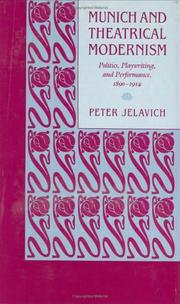| Listing 1 - 10 of 13 | << page >> |
Sort by
|

ISBN: 0674588355 9780674588356 Year: 1985 Publisher: Cambridge, Mass.: Harvard university press,
Abstract | Keywords | Export | Availability | Bookmark
 Loading...
Loading...Choose an application
- Reference Manager
- EndNote
- RefWorks (Direct export to RefWorks)
Theatrical science --- anno 1900-1909 --- Munich --- Theater --- Experimental theater --- Popular culture --- History --- Political aspects --- Munich (Germany) --- Intellectual life --- 830-2 --- -Popular culture --- -Theater --- -Dramatics --- Histrionics --- Professional theater --- Stage --- Theatre --- Performing arts --- Acting --- Actors --- Culture, Popular --- Mass culture --- Pop culture --- Popular arts --- Communication --- Mass society --- Recreation --- Alternative theater --- Avant-garde theater --- Duitse literatuur: toneel; drama --- -History --- -Intellectual life --- -Duitse literatuur: toneel; drama --- 830-2 Duitse literatuur: toneel; drama --- -830-2 Duitse literatuur: toneel; drama --- Dramatics --- Culture --- Intellectual life. --- Theater - Germany - Munich - History --- Experimental theater - Germany - Munich --- Theater - Political aspects - Germany - Munich --- Popular culture - Germany - Munich --- Munich (Germany) - Intellectual life
Book
ISBN: 0674067614 Year: 1993 Publisher: Cambridge (Mass.) : Harvard university press,
Abstract | Keywords | Export | Availability | Bookmark
 Loading...
Loading...Choose an application
- Reference Manager
- EndNote
- RefWorks (Direct export to RefWorks)
Music-halls (Variety-theaters, cabarets, etc.) --- Political satire, German --- Theater --- History. --- History and criticism. --- Political aspects --- Music halls (Variety-theaters, cabarets etc.) --- Germany --- Berlin (Germany) --- History --- Political satire [German ] --- History and criticism --- Music halls (Variety-theaters, cabarets, etc.) - Germany - Berlin - History. --- Political satire, German - Germany - Berlin - History and criticism. --- Theater - Political aspects - Germany - Berlin.

ISBN: 0520243633 Year: 2006 Volume: 37 Publisher: Berkeley ; Los Angeles University of California Press
Abstract | Keywords | Export | Availability | Bookmark
 Loading...
Loading...Choose an application
- Reference Manager
- EndNote
- RefWorks (Direct export to RefWorks)
This fascinating exploration of a work that was the epitome of German literary modernism illuminates in chilling detail the death of the Weimar Republic's left-leaning culture of innovation and experimentation. Peter Jelavich examines Alfred Doblin's Berlin Alexanderplatz (1929), a novel that questioned the autonomy and coherence of the human personality in the modern metropolis, and traces the radical discrepancies that came with its adaptation into a radio play (1930) and a film (1931). Jelavich explains these discrepancies by examining not only the varying demands of genre and technology but also the political and economic contexts of the media--in particular, the censorship practices in German radio and film. His analysis culminates in a richly textured discussion of the complex factors that led to the demise of Weimar culture, as Nazi intimidation and the economic strains of the Depression induced producers to depoliticize their works. Jelavich's book becomes a cautionary tale about how fear of outspoken right-wing politicians can curtail and eliminate the arts as a critical counterforce to politics--all in the name of entertainment.
Culture in motion pictures. --- Motion pictures --- Radio broadcasting --- History --- Döblin, Alfred, --- Germany --- Politics and government --- Intellectual life

ISBN: 9780674067622 0674067622 Year: 1996 Publisher: Cambridge (Mass.): Harvard university press,
Abstract | Keywords | Export | Availability | Bookmark
 Loading...
Loading...Choose an application
- Reference Manager
- EndNote
- RefWorks (Direct export to RefWorks)
Music-halls (Variety-theaters, cabarets, etc.) --- Political satire, German --- History and criticism. --- Music-halls (Variety-theaters, cabarets, etc.) - Germany. --- Political satire, German - History and criticism. --- -Theater --- -Music-halls (Variety-theaters, cabarets, etc.) --- -German political satire --- German wit and humor --- Cabarets --- Café theater --- Concert gardens --- Concert rooms --- Concert saloons --- Variety shows (Theater) --- Variety-theaters --- Theaters --- Vaudeville --- Dramatics --- Histrionics --- Professional theater --- Stage --- Theatre --- Performing arts --- Acting --- Actors --- History and criticism --- Political aspects --- -Political satire, German --- -History and criticism

ISBN: 0674039130 9780674039131 0674067614 9780674067615 0674067622 9780674067622 0674264762 9780674264762 Year: 1996 Publisher: Cambridge, MA : Harvard University Press,
Abstract | Keywords | Export | Availability | Bookmark
 Loading...
Loading...Choose an application
- Reference Manager
- EndNote
- RefWorks (Direct export to RefWorks)
Step into Ernst Wolzogen's Motley Theater, Max Reinhardt's Sound and Smoke, Rudolf Nelson's Chat noir, and Friedrich Hollaender's Tingel-Tangel. Enjoy Claire Waldoff's rendering of a lower-class Berliner, Kurt Tucholsky's satirical songs, and Walter Mehring's Dadaist experiments, as Peter Jelavich spotlights Berlin's cabarets from the day the curtain first went up, in 1901, until the Nazi regime brought it down. Fads and fashions, sexual mores and political ideologies--all were subject to satire and parody on the cabaret stage. This book follows the changing treatment of these themes, and the fate of cabaret itself, through the most turbulent decades of modern German history: the prosperous and optimistic Imperial age, the unstable yet culturally inventive Weimar era, and the repressive years of National Socialism. By situating cabaret within Berlin's rich landscape of popular culture and distinguishing it from vaudeville and variety theaters, spectacular revues, prurient "nude dancing," and Communist agitprop, Jelavich revises the prevailing image of this form of entertainment. Neither highly politicized, like postwar German Kabarett, nor sleazy in the way that some American and European films suggest, Berlin cabaret occupied a middle ground that let it cast an ironic eye on the goings-on of Berliners and other Germans. However, it was just this satirical attitude toward serious themes, such as politics and racism, that blinded cabaret to the strength of the radical right-wing forces that ultimately destroyed it. Jelavich concludes with the Berlin cabaret artists' final performances--as prisoners in the concentration camps at Westerbork and Theresienstadt. This book gives us a sense of what the world looked like within the cabarets of Berlin and at the same time lets us see, from a historical distance, these lost performers enacting the political, sexual, and artistic issues that made their city one of the most dynamic in Europe.
Music-halls (Variety-theaters, cabarets, etc.) --- Political satire, German --- Theater --- Dramatics --- Histrionics --- Professional theater --- Stage --- Theatre --- Performing arts --- Acting --- Actors --- German political satire --- German wit and humor --- Cabarets --- Café theater --- Concert gardens --- Concert rooms --- Concert saloons --- Variety shows (Theater) --- Variety-theaters --- Theaters --- Vaudeville --- History. --- History and criticism. --- Political aspects --- -Theater --- -Music-halls (Variety-theaters, cabarets, etc.) --- -Cabarets --- History and criticism --- -Political satire, German --- -German political satire --- Berlin (Germany) --- Social conditions
Digital
ISBN: 9780674039131 Year: 2021 Publisher: Cambridge, Mass. Harvard University Press
Abstract | Keywords | Export | Availability | Bookmark
 Loading...
Loading...Choose an application
- Reference Manager
- EndNote
- RefWorks (Direct export to RefWorks)
Book
ISBN: 9780870707957 Year: 2011 Publisher: New York City : The Museum of Modern Art,
Abstract | Keywords | Export | Availability | Bookmark
 Loading...
Loading...Choose an application
- Reference Manager
- EndNote
- RefWorks (Direct export to RefWorks)
expressionisme --- grafiek --- Wereldoorlog I --- Die Brücke (1905-1913) --- Dood --- dans --- Der Blaue Reiter --- menselijk lichaam --- religieuze iconografie --- natuur --- stadsleven --- seksualiteit --- portretten --- 20ste eeuw --- Duitsland --- Oostenrijk --- 76.037(430) --- 75.037(430) --- Grafiek ; Duitsland ; Oostenrijk ; 1ste helft 20ste eeuw --- Grafiek ; Duits Expressionisme ; Die Brücke --- Museumcatalogi ; New York ; MOMA --- Grafische kunst ; 1900 - 1950 ; Duitsland --- Schilderkunst ; 1900 - 1950 ; Duitsland --- Exhibitions --- Expressionism (Art) --- Prints, German --- Prints --- Fine prints --- Graphic arts --- Museum of Modern Art (New York, N.Y.) --- New York (City). --- New York (N.Y.). --- Nyū Yōku Kindai Bijutsukan --- MOMA --- Der Blaue Reiter (1911-1914) --- dansen --- Die Brücke --- expressionisme. --- Wereldoorlog I. --- Die Brücke. --- Dood. --- dansen. --- Der Blaue Reiter (1911-1914). --- menselijk lichaam. --- religieuze iconografie. --- natuur. --- stadsleven. --- seksualiteit. --- portretten. --- 20ste eeuw. --- Duitsland. --- Oostenrijk. --- Die Brücke (1905-1913).
Book
Year: 1982 Publisher: München : Prestel,
Abstract | Keywords | Export | Availability | Bookmark
 Loading...
Loading...Choose an application
- Reference Manager
- EndNote
- RefWorks (Direct export to RefWorks)
Kandinsky, Wassily. --- 1896 - 1914. --- 19de eeuw. --- 20ste eeuw. --- München.
Multi

ISBN: 9781442695122 9781442642928 Year: 2017 Publisher: Toronto, Ont. University of Toronto Press
Abstract | Keywords | Export | Availability | Bookmark
 Loading...
Loading...Choose an application
- Reference Manager
- EndNote
- RefWorks (Direct export to RefWorks)
Book

ISBN: 9781789203653 Year: 2001 Publisher: New York Oxford
Abstract | Keywords | Export | Availability | Bookmark
 Loading...
Loading...Choose an application
- Reference Manager
- EndNote
- RefWorks (Direct export to RefWorks)
| Listing 1 - 10 of 13 | << page >> |
Sort by
|

 Search
Search Feedback
Feedback About UniCat
About UniCat  Help
Help News
News